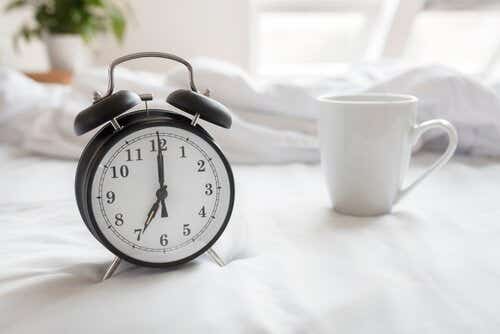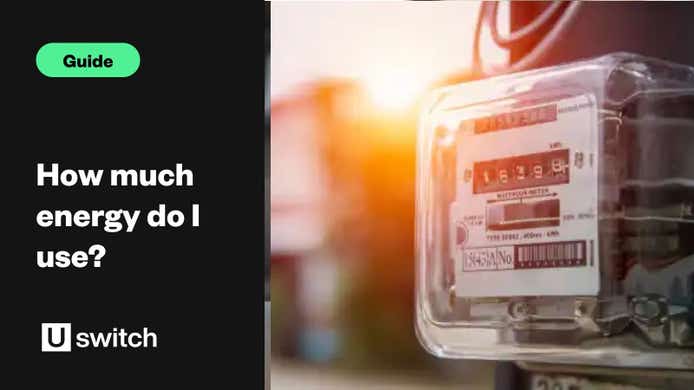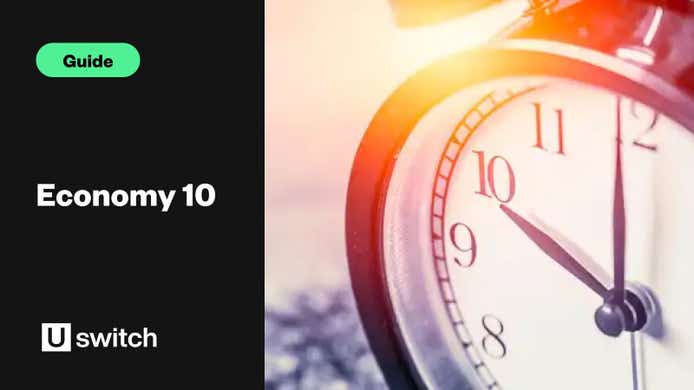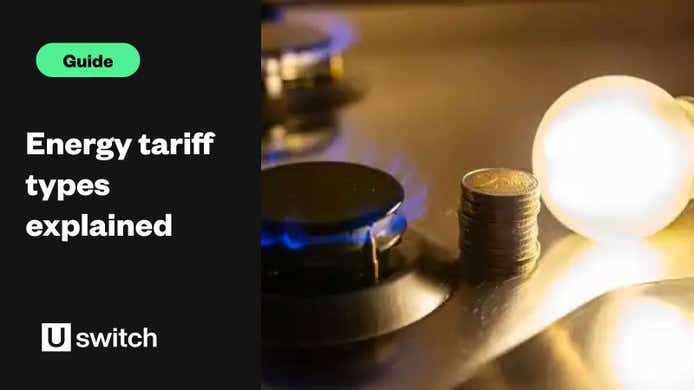Key takeaways
- Economy 7 tariffs provider cheaper electricity during seven night-time hours.
- They can be effective options for those whose lifestyle means they use a lot of energy at night (e.g. electric vehicle owners with home chargers).
- You'd need a special Economy 7 meter to sign up to an Economy 7 tariff.
- Electricity costs will usually be higher during the day to balance out the cheaper night-time rates.
What is Economy 7?
Economy 7 is a time-of-use energy plan, used alongside Economy 7 meters, which is designed to help you save money on energy use during night-time hours. Economy 7 meters, which have to be specially installed, track day and night use of electricity separately, so that a different kWh rate can be offered via an Economy 7 tariff - a bit like peak and off-peak phone calls. This can be a good way of saving money for energy customers.
How does Economy 7 work?
Economy 7 allows you to get cheaper electricity for seven hours each night. These tariffs use a different kind of electricity meter which, unlike a standard meter, can track the electricity you use during the day and at night separately. You’re then charged those different rates for the electricity you use during the day and the night. The day rate is often more expensive than day rates on a normal tariff, meaning that this doesn’t necessarily fit in with everyone’s lifestyle. However, it could work for you if you tend to use more energy during the specified Economy 7 times.
Economy 7 vs. standard energy
Economy 7 could be a cheaper option for those who use more energy at night than during the day. Standard energy tariffs mean that customers are charged the same amount per unit of electricity they use, regardless of the time of day or night they’re using it. If you're on an Economy 7 tariff, on the other hand, you'll be charged more during the day and less during the allocated Economy 7 times. That means washing clothes or running the dishwasher is a more cost-effective thing to do outside of daytime hours if you have an Economy 7 meter.
How to switch to Economy 7
If you don't have Economy 7 energy but would like to get it, you will need to go through the Economy 7 meter installation process.
- You should start by comparing Economy 7 prices. When we ask if you have Economy 7, select 'yes' and pick a supplier and tariff from the list - it doesn't matter which. Use your current usage details and estimate as best you can the percentage of your electricity you use at night.
- We will then show you which will be the cheapest Economy 7 tariff for you. Contact the supplier directly and ask them to switch you to Economy 7. You may find that there is an Economy 7 meter installation cost to pay.
Run an energy comparison
Enter your postcode below to compare energy prices and get started on your energy switch.
What is the cheapest Economy 7 tariff?
As is always the case with energy tariffs, the cheapest Economy 7 tariff for one person may not be the cheapest for someone else. It can depend on the region you live in and the amount of energy you use.
How to switch from an Economy 7 tariff to a fixed tariff
Switching from Economy 7 to a fixed tariff should be straightforward but you will need to contact your electricity supplier to find out more about the process. This is because you will probably need to meet some acceptance criteria to make the switch.
You may also have to have a new meter installed, which your energy supplier will often charge you for. In some circumstances you may be able to arrange to carry on using your Economy 7 meter when you switch to a fixed tariff; again, your current supplier should be able to tell you if this is the case.
Will Economy 7 save me money?
Economy 7 can save money for some households, but it is not the right electricity tariff for everyone. It works most effectively for those with storage heaters - if you don’t have one, it might not save you money. Some people with Economy 7 find that it makes their bills more expensive because they don't use enough energy during their Economy 7 times. Whether or not it will be cost-effective for you will depend on several different factors.
Electricity use
As a general rule of thumb, you would need to use more than 40% of your electricity at night to make Economy 7 cost-effective. Some Economy 7 plans charge a significant amount over the standard night rate for any electricity used in the day, which can cancel out the benefits of the cheap electricity you get at night. The more electricity you use at night and the less you use in the day, the more money you will save with Economy 7 energy.
Heating and water
An Economy 7 tariff is best suited to people who have electric storage heaters and a hot water tank. The idea is that you heat the electric storage heaters overnight and that they slowly emit the heat the next day, and that you heat all your hot water for the next day overnight too. If you heat your home and water with electricity, but don't have storage heaters or a hot water tank, Economy 7 energy probably won't be so cost-effective for you.
If you heat your home and water with gas, Economy 7 could still be a good fit for you, provided you use the bulk of your electricity at night.
Your appliances
To make the most of Economy 7, it helps if appliances like your dishwasher, washing machine and tumble dryer have a timer so that you can run them overnight during the cheaper Economy 7 times.
Your lifestyle
If you have storage heaters and a hot water tank, you will probably find that your home and water will be warm in the morning but will cool down again by the evening.
Think about whether or not this fits in with your lifestyle. If you work unusual hours, for example, you may find that your routine fits in with Economy 7 times because you use the bulk of your electricity at night anyway.
How do I know if I have an Economy 7 tariff?
If you're unsure as to whether or not you have Economy 7 energy, take a look at your electricity bill. If you have two different rates, one for the night and one for the day, then you have Economy 7.
The Meter Point Administration Number (MPAN) on your bill will also start with '02' if you have Economy 7. Find out where you can locate this information with our guide to understanding your energy bill. If you don't have a bill available, look at your meter (more information below).
If you are in any doubt, call your electricity supplier and check with it.
What is an Economy 7 meter?
An Economy 7 meter is a normal energy meter, but it will show two different rates for daytime and nighttime energy use.
How do I know if I have an Economy 7 meter?
It's fairly easy to work out whether you have an Economy 7 meter. The meter itself will have two sets of numbers - one marked 'low' (meaning ‘night’) and one marked 'normal' (meaning ‘day’), though your meter might not look exactly like the one in our picture.
Alternatively, there may be one set of numbers marked 'day rate', and a red button, which you press to get your night reading.
The meter may also have something like "multirate" printed on it.
How to read an Economy 7 meter
There are two types of Economy 7 meter - how you read your meter will depend on which type you have.
- The first type has two displays - the top row is for your day rate electricity and is marked 'Normal' and the bottom row, which is marked 'Low', shows night rate. When you read your Economy 7 meter, always check both displays.
- The second type has a single row of numbers that shows your day rate electricity usage. To get a reading for your night rate electricity, press the red button.
What are the Economy 7 times?
The cheaper Economy 7 time period usually runs either 11.00pm to 6.00am, 12.00am to 7.00am or 1.00am to 8.00am. However, this can vary according to where you live and your energy supplier.
Economy 7 times will also change when the clocks go back or forward. Contact your provider to check if you are in any doubt.
Can you get an Economy 7 smart meter?
You can get a smart meter if you’re on an Economy 7 tariff, but not all suppliers can offer this. The ease with which you can do so will depend on the supplier you’re with. You might find your options limited depending on what’s available at the time you’re looking to switch, but there should be at least a few available Economy 7 smart meter tariffs.
An Economy 7 smart meter will usually show you separate readings for your peak and off-peak use on an in-home display. Like all smart meters, an Economy 7 smart meter will send meter readings to your supplier so you no longer have to do it manually. According to the latest smart meter statistics, virtually all (95.5%) of UK smart meters now provide accurate readings to the energy provider. This can help ensure your bills are more accurate because they're based on regular meter readings and reduce the chance of human error when reporting your domestic energy consumption.
Is electricity cheaper at night?
During the off-peak Economy 7 times, electricity is much cheaper than standard electricity rates. However, during peak hours the rates are much higher than your ordinary electricity supplier’s rates.
On balance, if you used electricity in the same way as the average household, then Economy 7 would probably be more expensive than if you were on any other electricity tariff.
If your lifestyle fits in with Economy 7 times, meaning you use your electricity late at night and schedule your biggest energy-consuming appliances to run during the off-peak hours, then Economy 7 could save you money against the average standard rate tariff. However, you likely can save more by simply switching to a cheap, non-Economy 7 energy deal.
How does Economy 7 heating work?
Economy 7 heating works the same way as normal heating as long as the heating appliances are powered by electricity as opposed to gas. Whether you’re using an electric storage heater, water heater or any other heating appliance with Economy 7, using them during the night (if it fits in with your lifestyle) will be cheaper than using them during the day.
Storage heaters are particularly effective when they’re scheduled to work during the off-peak hours. They use energy to create heat but keep it locked in until you need it. Homes with a combination of a storage heater and Economy 7 meter usually set up the storage heater to operate in the middle of the night. During the peak hours, the storage heater's retained warmth is released to heat the home throughout the day.
Economy 7 and electric vehicles
Economy 7 is an excellent energy tariff option for the increasing number of people who have purchased an electric vehicle. The obvious thing to do is charge the vehicle overnight, and the cheapest way of doing that is to take advantage of lower energy prices during Economy 7 times.
You may be able to take advantage of tariffs specifically aimed at electric vehicle owners, so it's worth having a look to see what's available for you.
What is Economy 10?
Economy 10 (also known as Heatwise) is like Economy 7, except you get 10 hours of cheaper electricity rather than seven. Also, three of these hours are in the afternoon, and seven are overnight. It isn't possible to compare Economy 10 tariffs with Uswitch, so if you would like more information, contact your energy supplier.
Economy 10 vs. Economy 7
Economy 10 is much like the Economy 7 electricity tariffs, except that the off-peak hours run for 10 hours rather than seven.
Unlike Economy 7, Economy 10's off-peak hours usually work in three separate intervals, rather than operating consecutively (as such there are three separate unit rates).
Commonly with Economy 10, you have three hours of off-peak (low rates) in the afternoon, four hours in the evening, and three hours in the early morning.
To get the most out of an Economy 10 tariff, you would need to do more planning than on an Economy 7, but you would at least get more hours of the off-peak rate.
You can find out more in our guide about understanding Economy 10 tariffs. It’s worth noting that due to the complexity of the three different rates, many price comparison sites (including Uswitch) cannot support comparisons for Economy 10 meters. This makes it difficult to ensure you’re getting the best energy deal and it may be worth seeing if you can change your meter to a standard one.




